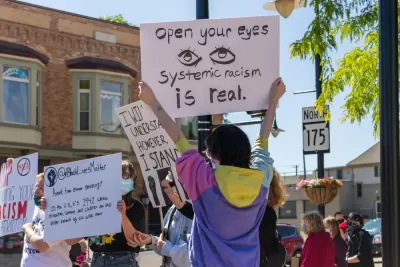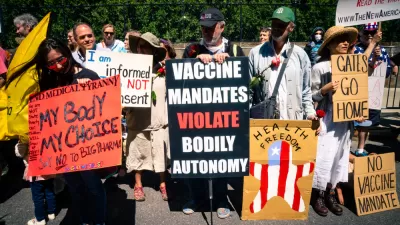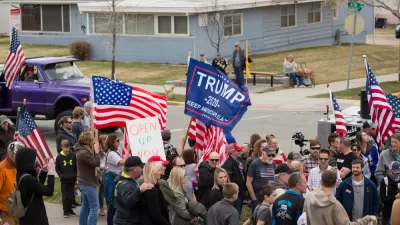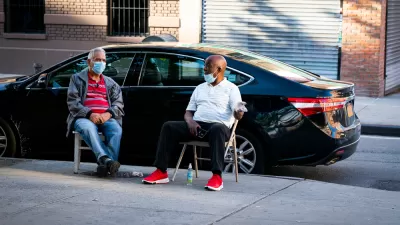New research from the Brookings Institution illuminates the racial disparities of public health outcomes both during and before the pandemic.

An article for the Brookings Institution, written by Andre M. Perry, Carl Romer, and Anthony Barr, digs into the poor life expectancy of Black Americans—public health outcomes connected to environmental injustices in predominantly Black communities.
The first paragraph of the article succinctly summarizes the disparities in the health impacts of the Covid-19 pandemic:
Earlier this year, the National Center for Health Statistics (NCHS) published data showing a 1.5-year decline in national life expectancy in 2020, largely due to the COVID-19 pandemic, which took the lives of approximately 375,000 Americans that year. The NCHS reported that white Americans’ life expectancy declined by 1.2 years; for Black Americans, that number was 2.9 years.
The article focuses on social determinants of health at the local level.
Because de jure and de facto segregation concentrated Black Americans in specific locales, racial injustices have occurred through place-based discrimination: disproportionate exposure to pollution and hazardous waste, harmful zoning practices, and post-disaster displacement, to name a few.
The article proceeds to present two findings from the authors' analysis that highlight "hyperlocal variation in life expectancy" prior to the pandemic. The first finding: "neighborhood life expectancy correlates with neighborhood demographics." The second: "neighborhood life expectancy disparities exist relative to the surrounding metro area."
The source article, linked below, provides more details on those findings, including the methodology for each. The conclusion the authors suggest, after presenting these findings, is critical for planners: "Both findings illuminate the fact that racial gaps in life expectancy manifest as place-based problems."
FULL STORY: Why is life expectancy so low in Black neighborhoods?

Planetizen Federal Action Tracker
A weekly monitor of how Trump’s orders and actions are impacting planners and planning in America.

Maui's Vacation Rental Debate Turns Ugly
Verbal attacks, misinformation campaigns and fistfights plague a high-stakes debate to convert thousands of vacation rentals into long-term housing.

Cuomo Is the Candidate of Both NIMBYs and Developers. What Gives?
In the New York City mayoral race, odd bedfellows align to preserve the housing status quo.

The Subversive Car-Free Guide to Trump's Great American Road Trip
Car-free ways to access Chicagoland’s best tourist attractions.

San Antonio and Austin are Fusing Into one Massive Megaregion
The region spanning the two central Texas cities is growing fast, posing challenges for local infrastructure and water supplies.

Charlottesville Temporarily Has No Zoning Code
A judge ordered the Virginia city to throw out its newly revised zoning code, leaving permitting for new development in legal limbo.
Urban Design for Planners 1: Software Tools
This six-course series explores essential urban design concepts using open source software and equips planners with the tools they need to participate fully in the urban design process.
Planning for Universal Design
Learn the tools for implementing Universal Design in planning regulations.
Heyer Gruel & Associates PA
JM Goldson LLC
Custer County Colorado
City of Camden Redevelopment Agency
City of Astoria
Transportation Research & Education Center (TREC) at Portland State University
Jefferson Parish Government
Camden Redevelopment Agency
City of Claremont





























